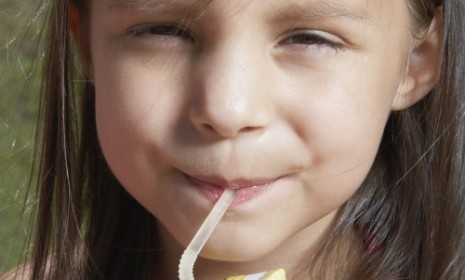Is there lead in your child's juice box?
An environmental group finds potentially health-threatening levels of lead in many juice boxes and fruit snacks. How worried should parents be?

A free daily email with the biggest news stories of the day – and the best features from TheWeek.com
You are now subscribed
Your newsletter sign-up was successful
As if parents didn't have enough worry about: A Californian environmental group says it has found traces of lead in some juice drinks and packaged fruit at levels far exceeding state and federal daily limits. Here, a quick guide to the findings and what they mean for families:
What exactly did the researchers find?
The Environmental Law Foundation, a California nonprofit, bought dozens of brands of juice boxes, bottled juice, and packaged fruit, and sent the lunchbox staples to an EPA-certified lab. In some cases, individual servings of apple juice, grape juice, packaged peaches, pears, and fruit cocktail contained lead subtantially above the FDA's daily limit (as well as the state of California's far lower limit). Doctors, however, generally caution that no level of lead intake is safe.
The Week
Escape your echo chamber. Get the facts behind the news, plus analysis from multiple perspectives.

Sign up for The Week's Free Newsletters
From our morning news briefing to a weekly Good News Newsletter, get the best of The Week delivered directly to your inbox.
From our morning news briefing to a weekly Good News Newsletter, get the best of The Week delivered directly to your inbox.
What brands were involved?
Lead was found in everything from grocery-store generics to national brands to premium organic labels. For example, a single serving of Santa Cruz Organic Concord Grape Juice and Dole Pear Halves each showed levels of lead "beyond what federal regulators consider safe." Beech Nut, Earth's Best, Gerber, Kroger, Minute Maid, Motts, Trader Joe's, and Walgreen's also tested postive for lead. (Here's a complete list.) The ELF based its result on single servings — so the lead ingested by a typical 5-year-old, who might consume several juice boxes and servings of fruit on an average day, could actually be several times higher.
How dangerous is this?
Lead causes serious developmental problems in children. "Their brain is not mature," says Dr. Megan Schwarzman, a University of California-Berkeley research scientist. "Their nervous system is not mature. All of their organ systems are developing rapidly." According to the American Academy of Child and Adolescent Psychiatry, lead exposure in small amounts can make children "appear inattentive, hyperactive, and irritable," while greater levels can cause learning and reading problems. High levels can result in severe brain damage, and even death.
A free daily email with the biggest news stories of the day – and the best features from TheWeek.com
What can be done to protect kids?
Many juice products have no lead at all, so the first step will be easy, David Schardt of the Center for Science in the Public Interest. Just figure out how they do it. "Are they choosing different fruits, fruits from different farmers who have avoided lead contamination of their products?" Schardt asks. "Or are their manufacturing processes of such a kind that they avoid adding lead to the food that they're processing?" Also, the Environmental Law Foundation has sent warning letters to the juice makers. Once pressed, says Environmental Law Foundation President Jim Wheaton, companies will have every reason to "find ways to get the lead out."
Sources: NPR, CafeMom, Strollerderby, Environmental Law Foundation
-
 Film reviews: ‘Wuthering Heights,’ ‘Good Luck, Have Fun, Don’t Die,’ and ‘Sirat’
Film reviews: ‘Wuthering Heights,’ ‘Good Luck, Have Fun, Don’t Die,’ and ‘Sirat’Feature An inconvenient love torments a would-be couple, a gonzo time traveler seeks to save humanity from AI, and a father’s desperate search goes deeply sideways
-
 Political cartoons for February 16
Political cartoons for February 16Cartoons Monday’s political cartoons include President's Day, a valentine from the Epstein files, and more
-
 Regent Hong Kong: a tranquil haven with a prime waterfront spot
Regent Hong Kong: a tranquil haven with a prime waterfront spotThe Week Recommends The trendy hotel recently underwent an extensive two-year revamp